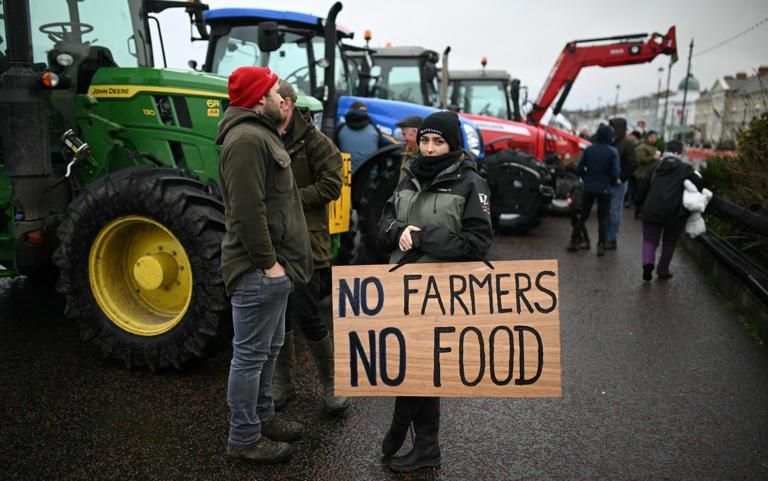In protest against the government's reforms to the inheritance tax, irate farmers have surrounded the Welsh Labour Party conference with tractors and farm equipment.
Early on Saturday morning, more than 100 cars gathered close to the Llandudno conference centre, with protesters arguing that the "tractor tax" would force many small farms to close.
When the Prime Minister told the delegates that they would "defend our decisions in the Budget all day long," they were furious.
A convoy of machinery honking horns and flashing lights stretched into the distance on both sides of the coastal town’s promenade. One tractor drawing laughter by playing a horn version of Old McDonald had a Farm on repeat.
The tractors held their loaders aloft with signs reading “Blood on Labour hands”, “No Farmers No Food” and “End Labour’s genocide on the countryside”, as party activists and officials filed into the conference centre.
Many of those taking part had been up before first light to milk cows and tend livestock before setting off for the protest.
Gareth Wyn Jones, a sheep farmer from Llanfairfechan and one of the organisers, said: “What Labour is doing now is biting the hands that feed them and it’s a massive mistake.
“They have awoken a sleeping giant and it’s time people understood we are not going to take any more. Enough is enough, we want change, we need support and we want the general public to get behind this campaign”
Speaking outside the Venue Cymru conference centre, Mr Wyn Jones, said the inheritance tax change would force farmers to increase the price of food.
He said: “It’s an industry that’s already broken, it needs support, inheritance tax is the final nail in the agricultural coffin.
“My family have farmed the land for 375 years and I could be the last generation. Can you imagine the feeling that we have that we need to protect these family farms?
“Every single person who has come here today, that’s what they are worried about, is making sure they can leave the land to the next generation so they can keep producing food affordable for this nation.”
Mr Wyn Jones said Welsh farmers would begin taking strike action on Sunday, adding: “This is a last resort. Many cannot afford this but there is growing anger in the countryside.”
Under Rachel Reeve’s Budget farming assets worth more than £1 million will be hit with a 20 per cent levy.
The Treasury has claimed the changes would only affect a small number of farms. But analysis by the National Farmers Union suggests that three-quarters of food produced by British farmers will be hit by the raid.
Campaigners claim the move will force many struggling families to break up their farms or sell them altogether.
Richard Bletcher, 39, who runs a farm in Buckley Flintshire, said his family’s livelihood and legacy was at stake.
“I’ve got young children, I’m a farmer’s son, once this inheritance tax comes in we’ll have to sell the farm,” he said. “We haven’t made any money for 10 years.
“I don’t think the government realises how serious this is because the food is still there.”
Mr Bletcher said the policies unveiled in Labour’s budget had scuppered his children’s dreams.
“I’ve got a four and a six year-old who love the farm. If it carries on like this, it won’t be there for them. This is it, it’s now or never. If this comes in, it will be devastating.”
Farmers and rural residents from Cornwall’s green belt have converged on New County Hall in Truro to voice their opposition to a plan to build a 125,000-panel solar farm near Fairpark, by the A30 between Carland Cross and Landrine.
Peter Lawrence, the co-founder of Farmers Movement Cornwall, said: “We are in the middle of a food security crisis. We only produce half of what we eat in this country. If we had a problem getting flood into the UK we could face starvation. It’s not solar panels and solar farms per se we are against, but we object to prime food producing land being used for solar farms deployment.”
The protests are set to continue on Parliament Square on Tuesday, with organisers warning that if ministers fail to listen to farmers’ demands then more militant groups will start taking direct action.
Dozens of farmers, some with children and many in overalls, peaked caps and wellies, crowded the front entrance to Venue Cymru as Sir Keir left by a back entrance and was driven away.
Organisers of the Welsh farmer’s protest were planning to deliver a letter to Sir Keir Starmer urging him not to destroy an already struggling industry.
Huw Roberts, 43, who raises suckler and beef cows in Wrexham, said the introduction of inheritance tax would tip his family over the brink.
“We want to be heard. Inheritance tax is going to be a killer for a lot of small family farms,” he said. “Our farm has been in the family for a hundred years. I’ve got small kids and I was hoping one day they would want it, but if I’m going to inherit it we’ll have to sell 20 odd per cent to pay for the inheritance tax and they’ll have to pay 20 per cent, other new taxes on top of that. There’ll be nothing left and that’s just in two generations. It’s going to break a lot of farmers, they’ll give up.”
Mr Roberts said there was a disconnect between Labour’s focus on the value farm assets and the actual slim margins farmers rely on.
“It’s value but you don’t have the cash from it. They’re the tools of your job,” he added.
Jo Stevens, the Welsh Secretary, said farmers need to start succession planning to avoid inheritance tax.
She told Sky News: “If you do succession planning for your business you can get to a situation where you don’t have any inheritance tax applying to your estate.”
Ms Stevens said it is unlikely farmers in Wales will be affected by the change in inheritance tax policy for farms.
“The data that we have from the Treasury is that only 500 farming estates across the whole of the UK, we think, will be affected by the changes,” she said. “And the nature of farming in Wales is such that there are lots of much smaller farms … so we don’t have those very big, wealthy farm owners like you see in some parts of the United Kingdom, they aren’t in Wales.”








.svg)

